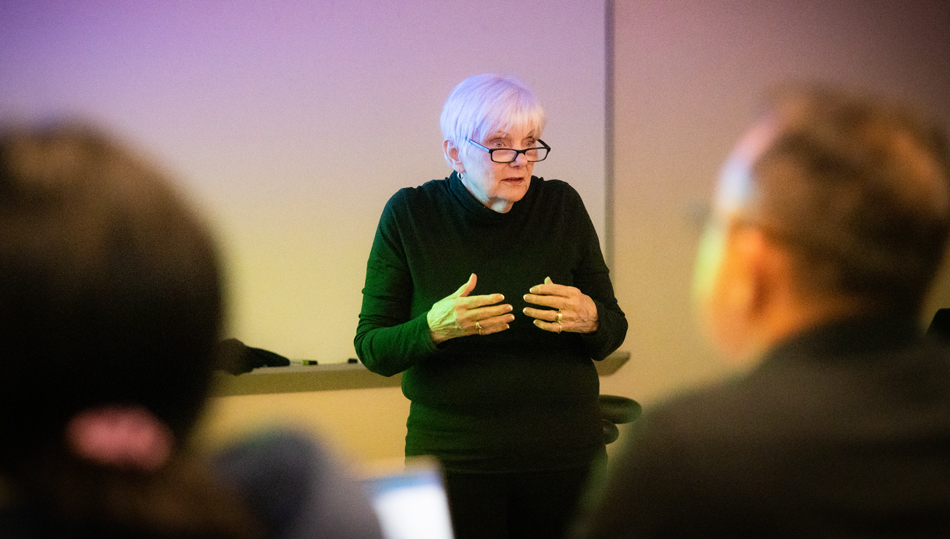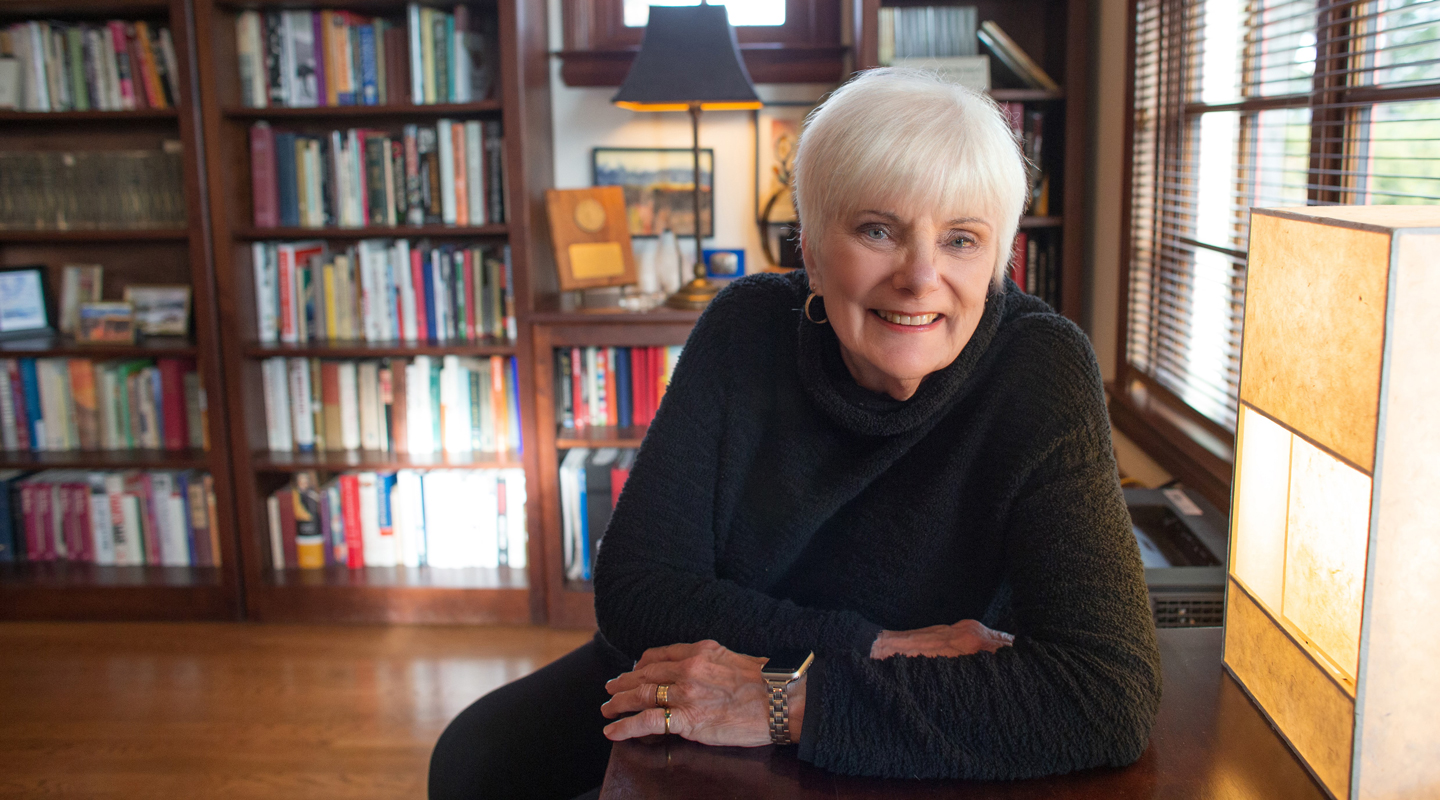The Silicon Valley Bank collapse in March wasn’t much of a surprise to Annie Searle, aka “The Risk Detective.” It had grown too big, too fast, and paid too little heed to warnings.
“The bank took on more risk than anyone understood,” says the iSchool associate teaching professor, who watched a similar unraveling at Washington Mutual savings and loan bank, where she worked as a senior executive until its historic demise in 2008.
“Everything at WaMu was growth: acquire, acquire, get bigger and bigger,” says Searle, who will be retiring from the classroom in mid-June after more than a decade at the iSchool.
A lifetime member of the Institute of American Entrepreneurs, Searle has brought a wealth of outside insights and experiences into iSchool classrooms. “I make use of everything I’ve ever done,” says the risk manager, who developed courses on information and operational risk at the iSchool that for years were regular electives in the Master of Science in Information Management (MSIM) program. She currently teaches an MSIM course on ethics, policy and law in information management, as well as courses in cybersecurity and risk management for undergraduates.
Students describe Searle as spirited, super supportive and unflappable, someone always eager for new insights and information. “I’m still a student myself,” she says. “I learn more from my students than they learn from me.”
The engaging teacher has a special talent for getting even the shyest person in class to participate in rigorous dialogue.
“Annie encouraged me to voice my insights, which often differed drastically from the experiences of my tech-sector colleagues, and she constantly grounded our discussions in real-world examples that starkly underscored the impacts information management can have on society at large,” says non-profit professional Phoebe Keleman (MSIM, ‘19).

Searle has always challenged her students to take on multiple points of view, including those opposite their own. She urges them to stand in someone else’s shoes, argue different sides of a question, and see issues through the diverse lenses of other nations’ ethical norms or laws. She regularly brings industry speakers into her classrooms to share varied views — from a retired Navy cryptographer and ACLU representative to Indigenous thought leaders and cybersecurity experts.
“The experiences Annie has had over the years, the organizational ups and downs she has seen, the connections she has made and the experts she has brought in from different fields of risk were super valuable,” says Divya Kothari (MSIM, ’17), who today works on privacy issues for Amazon’s AI tool Alexa. “Because of Annie’s classes, I have a perspective on risk that most of my peers don’t.”
Along with opening eyes and minds, Searle has pushed students to write, speak, formulate conclusions and make executive-level presentations. These skills are essential to leadership in increasingly complex workplaces, says Searle.
Her honors include the 2019 iSchool Teaching Excellence and Creative Honors (TEACH) award and an iSchool nomination for the UW’s 2020 Distinguished Teaching Award. At the iSchool, she co-developed the iTeach initiative, designed to support new and guest faculty. She also helped iSchool students create the UW’s chapter of ISACA (Information Systems Audit and Control Association), serving as academic advisor. She has served on the school’s Elected Faculty Council and as a UW faculty senator.
“I find that when you teach with both your head and your heart, you always get back more than you give.”
Searle’s path to the iSchool was a winding one. After graduating from the University of Iowa, with both a B.A. and M.A. in English Literature, she took a newspaper job in Rochester, New York, writing a help column. She left and spent three years in public television, followed by a job at Visual Studies Workshop as production editor of its newspaper Afterimage. In 1977, she moved to Seattle, where she oversaw the public relations, grants, and publications departments at the Seattle Art Museum for seven years.
She and her husband, UW professor emeritus Leroy F. Searle, worked at home developing the early technology that drove their startup Delphi Computers & Peripherals. She took it over in the mid-’80s, growing it into a $5 million-a-year operation that earned her the Northwest Entrepreneur of the Year and Matrix Table awards.
After selling Delphi, Searle was hired by Washington Mutual to bring its intellectual property back in house. She spent 10 years at the bank, with increasing levels of responsibility as a senior executive. When the bank failed, she stayed for six months to transition the risk, business continuity and change management programs she’d built over to its new owner, JPMorgan Chase.
Pained by the fall of WaMu and considering next steps, Searle listened hard when an iSchool faculty member suggested she take all that she knew and teach it in a UW classroom. She’d never considered teaching, never realized how much she would enjoy connecting with students. “I find that when you teach with both your head and your heart, you always get back more than you give.”
Searle has published widely. She is executive editor of “Reflections on Risk” a six-volume series of research notes that makes it possible for her iSchool students to be published scholars. Her “Advice from a Risk Detective,” published in multiple editions and written for the general public, covers everything from smart everyday tech precautions like password protections to the importance of not looking like a rich, clueless tourist when traveling.
In retirement, Searle plans to concentrate on watercolor painting and is considering reviving her college expertise in shooting pocket billiards. She is working on a new podcast series that will give a global focus to ethics and risk topics, inviting people from around the world to talk about issues from the perspective of their own countries’ norms.
Although she’s leaving the classroom, she will continue to head her independent advisory and research firm, Annie Searle & Associates LLC (ASA), which helps clients build risk programs in both private and public sectors. A sought-after writer and speaker, she publishes a regular column on the ASA website (anniesearle.com). A recent blog takes a hard look at artificial intelligence tools such as OpenAI’s text-generating ChatGPT.
Examining the dizzying growth of such machine-learning chatbots, she advises competing tech companies to slow down, have risk teams study what’s coming at them, make preparations for it and be able to say “no,” “wait,” “pause.”
“Those are three words we’re not hearing enough right now,” warns the Risk Detective.
